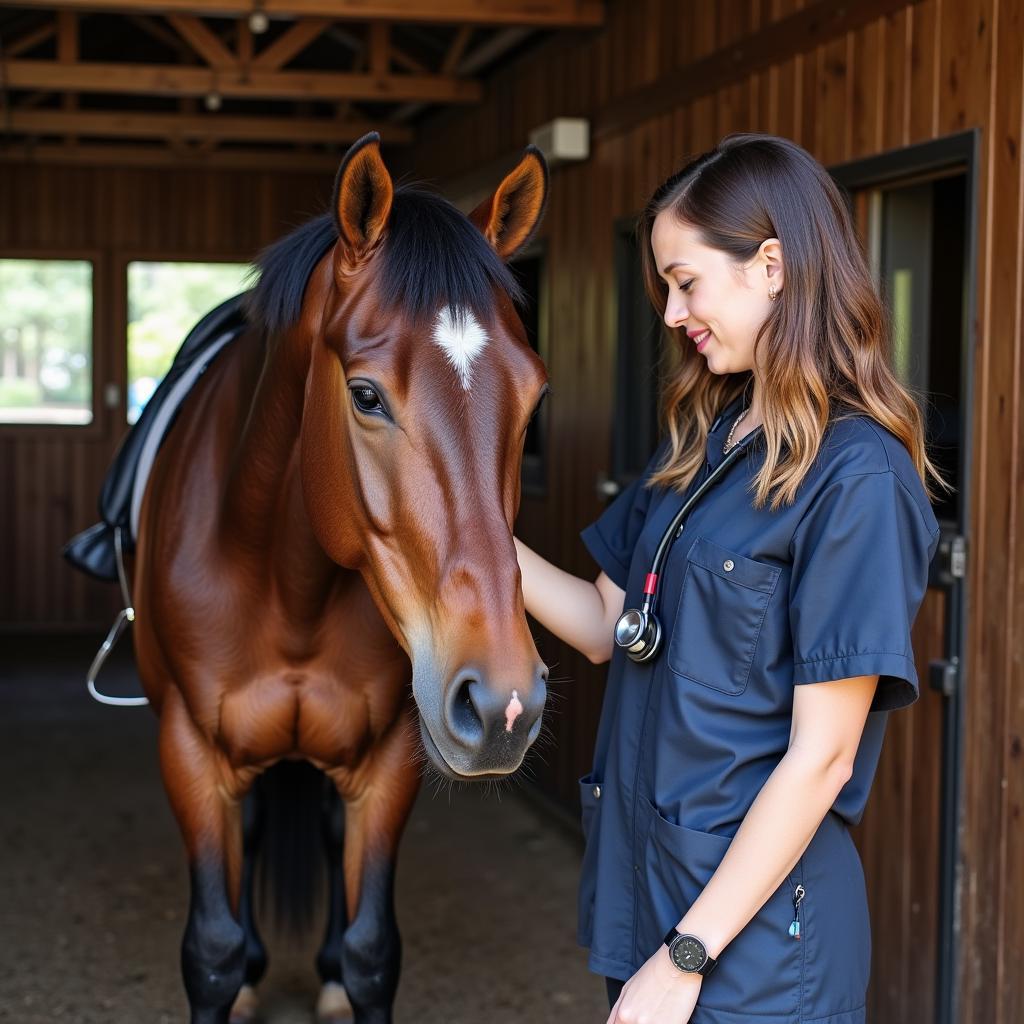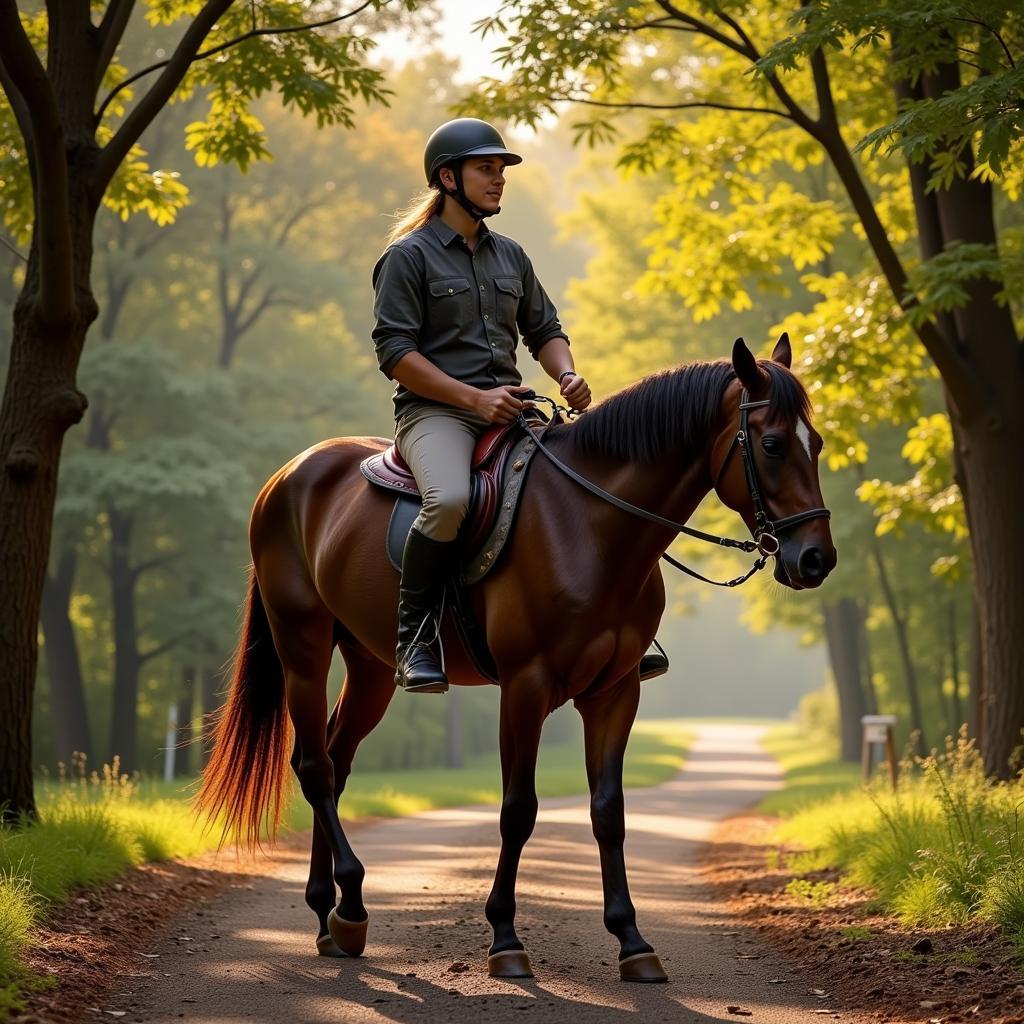Harley The Horse. This name evokes images of strength, freedom, and perhaps a touch of rebellion. But whether your Harley is a spirited stallion, a gentle mare, or a playful pony, providing the best possible care is essential. This comprehensive guide delves into the world of horse ownership, focusing on the specific needs and considerations for a horse named Harley.
Understanding Your Harley the Horse
Every horse is an individual, and understanding Harley’s personality, breed, and history is crucial for providing tailored care. Is Harley a high-energy Thoroughbred who needs plenty of exercise, or a laid-back draft horse content with leisurely trail rides? Knowing Harley’s background will help you anticipate his needs and create a strong bond. For example, if you find information about a “dark horse Harley” in his history, it might suggest a hidden talent or a surprising lineage. You might even find specialized gear, like dark horse harley.
Breed Specific Needs
Different breeds have different predispositions to certain health issues and require specific care. A sturdy draft horse like a Clydesdale will have different nutritional needs than a sleek Arabian. Researching Harley’s breed will help you determine the optimal diet, exercise routine, and preventative healthcare measures.
 Harley the horse receiving a routine check-up from a veterinarian
Harley the horse receiving a routine check-up from a veterinarian
Essential Care for Harley the Horse
Providing proper nutrition, shelter, and healthcare are fundamental to Harley’s well-being. A balanced diet of hay, grain, and supplements should be tailored to Harley’s age, activity level, and overall health. Ensure access to clean, fresh water at all times. Adequate shelter is crucial, providing protection from the elements and a safe, comfortable space to rest. Regular veterinary check-ups, vaccinations, and dental care are essential for preventative health. Consider charley horse hats to protect Harley from the sun and insects during outdoor activities.
Creating a Safe and Enriching Environment
Beyond the basics, creating a stimulating and enriching environment is vital for Harley’s mental and emotional health. Horses are social animals and thrive on interaction. Providing opportunities for socialization with other horses, along with regular exercise and mental stimulation, will keep Harley happy and engaged. This might include incorporating toys, puzzles, and varied terrain into his environment.
Training and Handling Harley the Horse
Building a strong, trusting relationship with Harley through consistent and positive training is paramount. Whether you are a seasoned equestrian or a new horse owner, working with a qualified trainer can help you establish effective communication and build a solid foundation for a harmonious partnership.
Understanding Horse Behavior
Recognizing Harley’s body language and vocalizations is crucial for effective communication. Learning to interpret his subtle cues will enable you to understand his needs and emotions, fostering a deeper connection and ensuring his safety and well-being. What does it mean when Harley pins his ears back or swishes his tail? Understanding these signals will prevent misunderstandings and strengthen your bond. Check out our harley horse page for more information about horse care.
 A rider on Harley the horse enjoying a scenic trail ride through a forest
A rider on Harley the horse enjoying a scenic trail ride through a forest
Conclusion
Caring for Harley the horse is a rewarding experience. By understanding his individual needs and providing a nurturing environment, you can ensure a long, happy, and healthy life for your equine companion. Remember, responsible horse ownership requires ongoing learning and dedication. For more specific information regarding motorcycle brands and their relation to horses, you might be interested in harley davidson iron horse or harley davidson dark horse.
FAQ
- What is the best way to bond with Harley the horse?
- How often should Harley receive veterinary check-ups?
- What are the signs of a healthy horse?
- How much exercise does Harley need?
- What is the best type of feed for Harley?
- How can I create a safe and stimulating environment for Harley?
- How can I tell if Harley is happy?
Common Scenarios and Questions
Scenario: Harley seems less energetic than usual.
Question: What are the potential causes of lethargy in horses, and when should I consult a veterinarian?
Scenario: Harley is refusing to eat his grain.
Question: What could be causing Harley’s loss of appetite, and what steps can I take to address this issue?
Further Resources
For more information on horse care, visit our website.
Contact Us
When you need support, contact us at Phone Number: 0772127271, Email: [email protected] or visit our address: QGM2+WX2, Vị Trung, Vị Thuỷ, Hậu Giang, Việt Nam. We have a 24/7 customer support team.